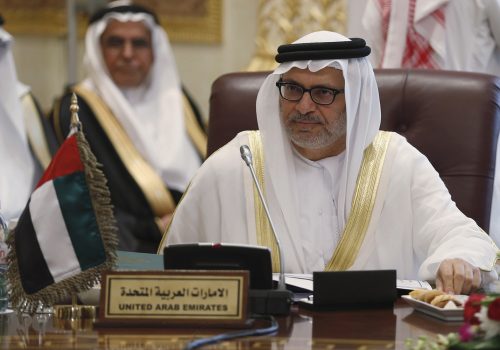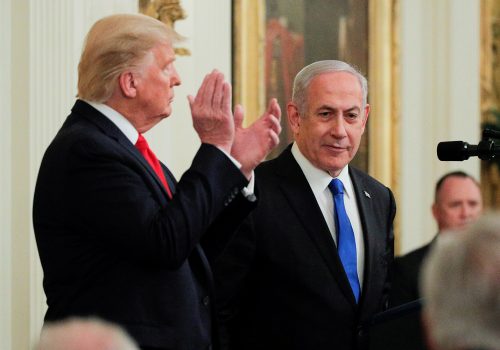The Caesar Act might alter the UAE’s normalization policy with Syria
Under the auspices of the Caesar Act, the United States has double-downed on sanctions aimed at isolating the Bashar al-Assad regime and cutting off foreign financial support for Syrian government-led reconstruction. The wide-ranging sanctions hit hard at the United Arab Emirates (UAE), who is now vulnerable to having its ties to the regime exposed. Ambassador James F. Jeffrey, US Special Representative for Syria Engagement, warned that anyone in the UAE or another country who engages in economic activities with Syria will become “a potential sanctions target.” The ambassador’s frank and cautionary sentiments directed at Emirati entities cast a shadow over the UAE’s reputation as one of the US’s strongest allies in the Gulf. The bilateral partnership between Abu Dhabi and Washington is anchored in shared security interests and counterterrorism efforts. Despite this, Abu Dhabi has not been shy to gravitate from the US and its other allies at times, particularly when it comes to its policy in Syria.
Over the past two years, the UAE has made conciliatory advances toward Damascus. The benefits of Emirati and Syrian commercial ties have been a motivating force for the UAE to re-engage with President Assad. On one side, UAE investors have always been allured by the sizable financial gains that can be had from reviving Syria’s economy in its post-conflict reconstruction phase. On the other side, wealthy Syrians and businessmen have flocked to the UAE, oftentimes attempting to shield themselves from Washington’s radar vis-à-vis profit-generating business fronts based in the Emirates.
What is of concern now is uncertainty over who may become a target to secondary sanctions under the Caesar Act. This has weighed on the minds of businessmen who maintain direct or indirect links to Syria. As made clear by the Caesar Act’s purpose and intent, Emiratis stand as no exception to sanctions. Therefore, it is worth re-evaluating the UAE’s embryonic relationship with Syria amid a new wave of sanctions and how it may come to be altered.
The UAE’s shifting narrative on Syria since 2011
In response to the violent crackdown on Syrian protestors in 2011, the member states of the Gulf Cooperation Council (GCC) issued a joint statement that condemned the government’s heavy-handedness and urged President Assad to end the “bloodshed.” By March 2012, the UAE closed its embassy in Damascus and suspended diplomatic activities, following suit of fellow GCC partners.
However, the UAE’s position shifted as the Syrian civil war drew wider foreign involvement. After supporting US and GCC allies by backing armed opposition groups—such as the Free Syrian Army (FSA)—Abu Dhabi became increasingly wary about the possible rise of Islamist groups. In lieu of regime change, the UAE focused on countering the Islamic State of Iraq and al-Sham (ISIS) and deterring the Muslim Brotherhood from gaining traction. Hinting at a less adamant intention to dispose Assad from power, Foreign Minister Anwar Gargash declared that the UAE did not want to create a political vacuum or dismantle Syria’s institutions. Therefore, the position of the UAE landed on a more common footing with Russia—the latter of whom emerged as a player in 2015—as both recognized that Assad could be included in Syria’s future. With concerns over regional destabilization, the UAE also saw the Syrian arena as a means to offset Iran and Turkey’s expanding spheres of influence.
One clear act of diplomatic signaling occurred when the UAE reopened its embassy in Damascus in December 2018. Following the announcement, Foreign Minister Gargash tweeted that the UAE’s decision to return “to political and diplomatic work in Damascus” came “after a careful reading of developments.” He added the re-activation of the “Arab role” was one of necessity due to Iranian and Turkish encroachment in Syria. A day after the UAE’s announcement, Bahrain released a statement that affirmed the kingdom had continued operations in its Damascus embassy “without interruption.”
On the humanitarian and development front, the UAE has provided over $530 million worth of aid to “alleviate the suffering” of Syrians and refugees since 2012. The impact of the coronavirus pandemic in recent months has compounded Syria’s worsening socio-economic outlook, with 80 percent of the population slipping below the poverty line. To capitalize on its efforts, the UAE has projected a pro-humanitarianism image to reinforce its Syria policy. On March 27, Abu Dhabi’s Crown Prince Sheikh Mohammed Bin Zayed Al Nahyan (MBZ) called President Assad, marking the first direct contact between an Arab leader and the Syrian president since 2011. The crown prince assured Assad that Syria would not stand alone to face the virus as Abu Dhabi upheld its “willingness to help the Syrian people.” Undeniably, the publicized interaction between the leaders invited significant international attention to the UAE’s stabilizing relations with Damascus.
The crux of Emirati and Syrian commercial interests
The established commercial connections between the UAE and Syria further illuminate the two countries’ interest-based ties. Before 2011, the UAE stood as Syria’s second-largest Arab investor, with total investments estimated at around $20 billion. During this period, Emirati and other Gulf-based conglomerates sought profitable stakes in Syria’s real estate and tourism sectors, according to Rashad Al-Kattan, a research fellow at the University of St. Andrews. Despite the UAE’s temporary suspension of diplomatic relations, Emirati businessmen and UAE-based Syrian businessmen maintained keen interests in Syrian reconstruction. Most notably, Abdul Jalil Al-Blouki, a senior Emirati businessman close to Abu Dhabi’s ruling family, visited Damascus in August 2018 to discuss possible investment opportunities.
In January 2019, after the restoration of diplomatic ties, Abu Dhabi launched a private sector forum where Emirati and Syrian businessmen discussed potential investment and commercial opportunities. The forum included a Syrian trade delegation led by Muhammad Hamsho, who was sanctioned by the US in 2011 and is known as a close associate of Maher Al-Assad, President Assad’s younger brother. A few months later, in August 2019, a delegation of over forty businessmen from the UAE attended a state-backed trade fair in Damascus meant to encourage foreign investment in reconstruction efforts. Reports of Emirati participation in the trade fair prompted warnings from Washington not to conduct business with the Syrian government and associates of President Assad.
For wealthy Syrians, the UAE has been a prime destination and financial hub. As the civil war escalated, the Emirates became host to a number of families associated with the Syrian regime; among them being Bushra Al-Assad, the sister of President Assad. To try to sidestep international sanctions, well-known Syrian oligarchs—such as Samer Foz and Assad’s maternal cousin, Rami Makhlouf—set up some of their businesses through an intricate network of shell companies in Dubai’s Jebel Ali Free Zone Authority (JAFZA). According to a report conducted by the Center for Advanced Defense Studies (C4ADS), Dubai’s attraction lies in its “high-end luxury real estate market and lax regulatory environment,” allowing individuals to “engage in illicit activity.” Syrian nationals Wael Abdulkarim and Ahmad Barqawi, along with Makhlouf, were noted as key individuals who owned a handful of properties and ran various businesses in Dubai.
Despite all these efforts, those seeking to circumvent sanctions have not been successful. In 2016, Dubai and Damascus-based Yona Star was sanctioned by the US Treasury Department’s Office of Foreign Assets Control (OFAC) after violating an arms embargo imposed against the Assad regime and operating as a shipping agent for sections of the Syrian military. In the same year, the US Treasury sanctioned Cham Wings Airlines whose chairman, Issam Shammout, had been suspected of having connections to Makhlouf. The Treasury’s sanctions also targeted the Qaterji brothers in 2018 for the illicit trade of fuel to the Assad regime and ISIS-affiliates, and UAE-based Sonex Investments Ltd. for chartering vessels to ship crude oil and petroleum products to Syria. Moreover, in 2019, the Treasury designated Samer Foz’s UAE-based ASM International Trading, which served as “a means of exploiting the international financial system outside of Syria.”
The Caesar Act’s implications for the Emirati-Syrian relationship
The UAE’s foreign policy, along with its underhanded commercial interests, lie at the nexus of its calculated strategy in Syria. Abu Dhabi’s overtures toward the Assad regime, framed as mere pragmatism, have steadily increased in the past two years. Though Emirati and Syrian individuals are not immune to sanctions, the UAE has not displayed a change in behavior. However, the Caesar Act now presents a serious roadblock to future plans for Emirati investment in Syrian reconstruction. The expansive implementation potential of the Caesar Act means that the UAE could be more motivated than ever to reel-in Emirati investors working with regime-linked businessmen and their elusive networks. Even if the US chooses to withhold more punitive measures against Emirati entities for the time being, Abu Dhabi’s posture of rapprochement with Syria may come under closer scrutiny from Washington down the road.
Emily Santucci is an intern with the Atlantic Council’s Rafik Hariri Center for the Middle East. Follow her on Twitter @emilysantucci.
Image: Syria's President Bashar al-Assad addresses the new members of parliament in Damascus, Syria in this handout released by SANA on August 12, 2020 via REUTERS.


